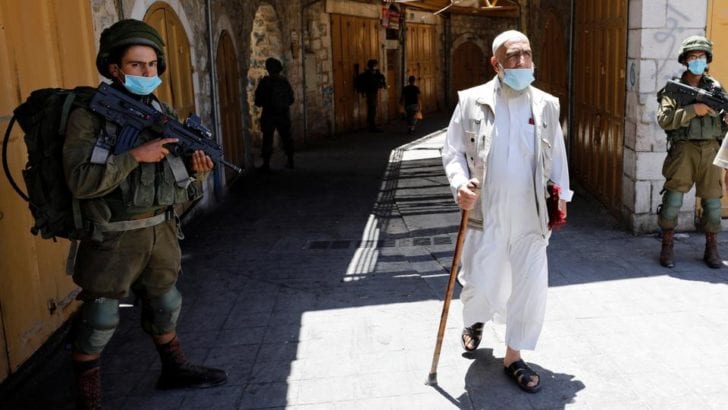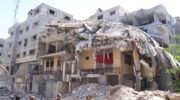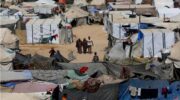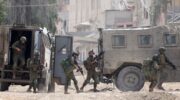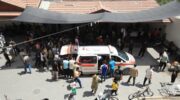A Palestinian man passes by Israeli soldiers in Hebron in the Israeli-occupied West Bank, July 2, 2020.
The UN published its biweekly report on the humanitarian situation in the Palestinian territories. As usual, Israeli soldiers and settlers carried out arrests and attacks, and caused property damage, including uprooting hundreds of Palestinian farmers’ trees.
reposted from UN Office for Humanitarian Affairs
Statistics from 5-18 January 2021:
Two Palestinians reportedly attacked Israelis in two separate incidents and were subsequently shot; one was killed and the other injured. [NOTE: Israeli soldiers have been known to plant weapons on Palestinians.]
- On 5 January, at the Gush Etzion junction (Hebron), a 25-year-old Palestinian man [allegedly] approached the security coordinator of an Israeli settlement and threw a knife at him, following which the latter shot and killed him, according to Israeli sources. [NOTE: IMEMC indicates that Israeli soldiers offered no evidence to support their claim of an attack.]
- On 13 January, at a checkpoint in the old city of Hebron, a Palestinian man reportedly tried to stab a Border Police officer and was then shot and injured by Israeli forces.
- The day before, at Qalandiya checkpoint (Jerusalem), a Palestinian man reportedly attacked an Israeli security guard with a screwdriver and was subsequently arrested.
79 Palestinians, including 14 children, were injured across the West Bank in clashes with Israeli forces.
- Most of those wounded (59) sustained their injuries in protests against the establishment of two settlement outposts near Al Mughayyir and Deir Jarir villages (Ramallah) or against settlement activities near Kafr Qaddum (Qalqiliya).
- An Israeli soldier was also injured in one of the clashes in Al Mughayyir; the village’s main entrance was blocked for vehicular movement for over a week.
- Eight Palestinians were shot and injured while trying to enter Israel through a breach in the Barrier near Tulkarm. [NOTE: the victims were day laborers, not terrorists. Israeli military are aware of the regular stream of Palestinians who cross the border through some 300 such breaches in order to get work and feed their families. Some go through the breaches to avoid the humiliation of being searched and questioned; others have not been able to get a permit.]
- Another two Palestinians were injured in two protests against the shooting of a man during a confiscation incident occurred on 1 January in Ar Rakeez, in southern Hebron, and against the uprooting of trees in Deir Ballut (Salfit).
- The remaining injuries were recorded during search-and-arrest operations in Qabatiya (Jenin), Tammun (Tubas) and the Aqbet Jaber (Jericho) and Ad Duheisheh (Bethlehem) refugee camps, or in clashes at various checkpoints.
- Fifty-five of the injured people were treated for inhaling tear gas, 14 were shot with live ammunition, eight were hit by rubber bullets, and the remaining ones were physically assaulted.
Israeli forces carried out 161 search-and-arrest operations and arrested 157 Palestinians across the West Bank. [NOTE: “search and arrest operations,” according to soldiers themselves, generally serve no purpose other than “to instill a sense of persecution among the Palestinians…a routine of exposure and invasion…a rolling trauma.” The effort is better characterized as “invasion and abduction” by a foreign army. See this.]
- The Jerusalem governorate has continued to record the highest number of operations (33), mostly occurring in East Jerusalem.
Two Palestinians sustained critical injuries in the Hebron governorate when unexploded ordnance they were handling exploded, in separate incidents.
- One of them was working his land near the Barrier, next to As Samu’ village.
- The other, a 17 year-old boy, was herding his livestock near Mirkez, in an area that the Israeli authorities designated for military training. The Israeli army supported the transfer of the boy to an Israeli hospital for medical treatment.
On 18 January, two rockets were shot from Gaza towards Israel, following which, Israeli forces carried out airstrikes in Gaza.
- The Palestinian rockets were reportedly activated automatically due to the weather conditions and fell into the sea next to Israel’s coast.
- The Israeli strikes reportedly struck military targets, damaging an agricultural field in Khan Younis.
On at least 47 occasions, Israeli forces opened warning fire near the perimeter fence or off Gaza’s coast, presumably to enforce access restrictions.
- Also, on two occasions, Israeli forces conducted land leveling near the fence.
Citing the lack of building permits, the Israeli authorities demolished or seized 24 Palestinian-owned structures across Area C, displacing 34 people and otherwise affecting almost 70.
- Ten of the targeted structures, including homes, animal shelters and mobile latrines, were located in the Beit Iksa Bedouin community (Jerusalem), where 27 people, half of them children, were displaced.
- Four of these structures had been provided as humanitarian aid.
- A family of seven living in an ancient building in Khirbet Fraseen (Jenin) was displaced following the removal or demolition of windows, doors, water pipes, electricity cables and a toilet they had added to their home, which the Israeli authorities say is located in an archaeological site.
- A recently constructed school in Umm Qussa (Hebron) received a ‘removal notice’ under Military Order 1797, which allows for its demolition within 96 hours.
- No demolitions were recorded in East Jerusalem.
Israeli authorities uprooted about 1,370 Palestinian-owned trees on grounds that the land had been declared ‘state land’, and confiscated 237 sheep claiming they were grazing in an area declared as a nature reserve.
- The uprooting incidents occurred in Deir Ballut (Salfit) and Beit Ummar (Hebron).
- In 2020, the Israeli authorities uprooted an estimated 4,164 Palestinian trees, nearly 60 per cent more than in 2019.
- The confiscation of the sheep took place near Near Wadi Fuqin (Bethlehem), where the herder was issued a fine of ILS 50,000 (US$15,200).
Eight Palestinians were injured and dozens of Palestinian-owned trees and vehicles were vandalized by perpetrators known or believed to be Israeli settlers.
- An 11-year-old girl was stoned and injured near her house in Madama (Nablus).
- Six men were physically assaulted in separate incidents while working their land near Aqraba (Nablus) and Kafr Malik (Ramallah).
- A man sustained injuries during stone-throwing at Palestinian vehicles in the Ramallah area.
- At least six Palestinian vehicles were damaged in stone-throwing incidents, while additional cars in East Jerusalem were vandalized during settler protests against the death of an Israeli boy in a car chase with the Israeli Police.
- Over 230 olive trees and saplings were damaged near the villages of Beit Ummar in Hebron and Jalud in Nablus.
One Israeli woman was injured and 27 Israeli-plated vehicles were damaged by perpetrators believed to be Palestinians in 26 incidents across the West Bank, according to Israeli sources. [NOTE: Saed Bannoura of International Middle East Media Center (IMEMC) stated that the occupation army has been known to inflate these figures, and pointed out that many more Palestinians are injured in an average month than Israelis.]
- Twenty-three of these incidents included stone throwing.
- Three incidents involved Molotov cocktails.
RELATED READING:
- Headlines from Palestine that Israel doesn’t want you to read
- Israeli harassment of Palestinian Bedouin village won’t let up
- Media bias: CNN and NPR are afraid to say “Apartheid” out loud
- The bizarre case of Mohammad El-Halabi displays Israeli “justice”
- The COVID-19 vaccine: another ugly face of Israeli apartheid
- WATCH: Daily Life in Occupied Palestine

